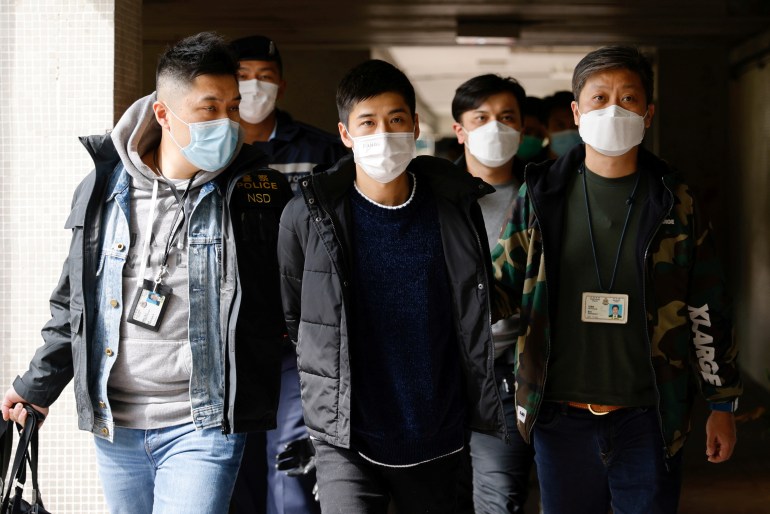Five Hong Kong democracy protesters seek asylum in the US
Young activists now in exile tried to flee to the self-ruled island of Taiwan in late July and were intercepted by its authorities.

Five Hong Kong democracy protesters who reportedly fled to Taiwan have arrived in the United States intending to seek asylum, an activist group said on Saturday.
Their escape follows the mass arrest of democracy figures in Hong Kong under a new national security law that is part of a mounting crackdown by China on the financial hub.
Keep reading
list of 3 itemsChina plans further Hong Kong crackdown after mass arrest: report
Hong Kong police detain 11 for allegedly helping activists escape
The Hong Kong Democracy Council (HKDC), an American group, said it had welcomed a group of young activists to the US this week and their journey had been “arduous and perilous”.
“The activists, all under the age of 30, took part in the ongoing pro-democracy protests in Hong Kong, faced protest-related arrests and charges, and fled the city by boat last July,” Samuel Chu, founder of HKDC, told AFP.
“I am relieved and overjoyed to welcome them to the United States and to assist them as they seek asylum and a new life,” Chu added.
Through a statement issued by the HKDC, the five activists now in exile said their hearts have been “filled with anxiety and all kinds of emotions” from the moment they left Hong Kong.
Taiwanese media in August reported that the five tried to flee to the self-ruled island in late July and were intercepted by its authorities.
Officials in Taiwan have since kept a low profile regarding the case, declining to comment.
Perilous border crossing
After enormous democracy protests across Hong Kong in 2019 in which more than 11,000 people were arrested, Beijing imposed a sweeping national security law late last June to silence dissent.
In August, another group of 12 Hong Kong activists, including one arrested under the national security law, attempted to flee by speedboat to Taiwan but were arrested by Chinese coastguards.
Last month a Chinese court jailed 10 of these 12 fugitives for up to three years for “organising and participating in an illegal border crossing”.
Chu said that the five Hong Kongers could have easily perished at sea or met the same fate as the “Hong Kong 12” without the help from ardent supporters who provided shelter and protection along the way.
“Their desperate effort exemplifies the rapidly deteriorating human rights condition and growing humanitarian crisis Hong Kong is in right now,” Chu said, adding that the options for safe passage are limited.
At least 50 former Hong Kong protesters applied for asylum in various jurisdictions before the coronavirus pandemic ended most international travel last year. Hundreds more have relocated to democratic Taiwan.
More Chinese officials sanctioned
The latest development comes as the US announced sanctions against six Hong Kong or Chinese officials it blamed for implementing a new security law in Hong Kong, following the mass arrests of pro-democracy activists this month.

Hong Kong police arrested 53 people on January 5 in the biggest crackdown on the democracy movement since China last year imposed a security law which opponents say is aimed at quashing dissent in the former British colony.
“This action by Hong Kong authorities is yet another stark example of Hong Kong’s freedoms and democratic processes being fundamentally undermined,” US Secretary of State Mike Pompeo said in a statement.
Pompeo said 13 former Legislative Council members, an American lawyer and a former law professor were among those reportedly detained before being released on bail. He called for the freeing of all those held under the security law.
Pompeo said those targeted with sanctions included You Quan, vice chairman of Beijing’s Central Leading Group on Hong Kong and Macau Affairs, and Sun Qingye, deputy director of Hong Kong’s national security office.
Three officers of the National Security Division of the Hong Kong police were named – Frederic Choi Chin-Pang, Kelvin Kong Hok Lai, and Andrew Kan Kai Yan.
Tam Yiu-Chung, a Hong Kong delegate to China’s National People’s Congress Standing Committee, was also designated. Pompeo said all were associated with “developing, adopting, or implementing the National Security Law”.
The sanctions require the freezing of US-linked assets of those targeted. China’s Washington embassy did not immediately respond to a request for comment.
Pompeo warned last week of fresh sanctions in response to the arrests. That warning came a day after supporters of President Donald Trump stormed Congress in a bid to overturn his November election defeat, prompting China’s state media to accuse US politicians of “double standards”.
Pompeo also said last week that Washington would explore restrictions against the Hong Kong Economic and Trade Office in the United States, but Friday’s announcement made no mention of this.